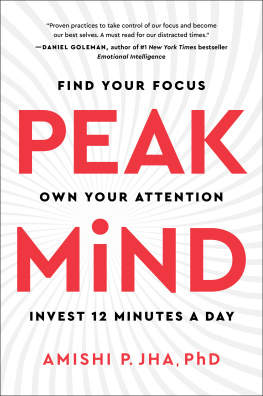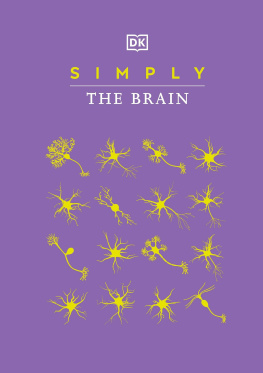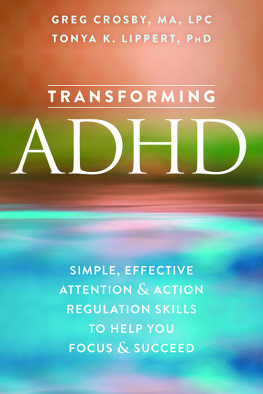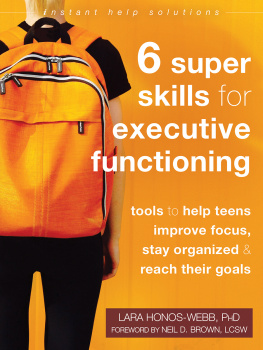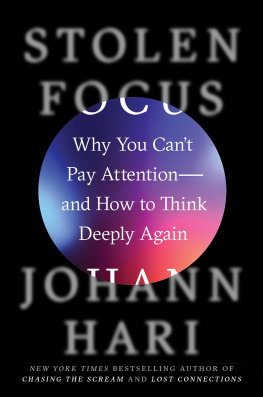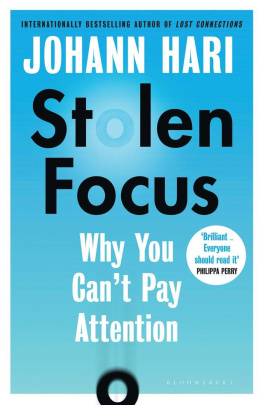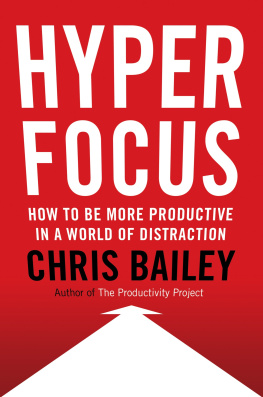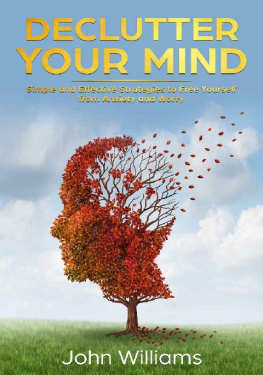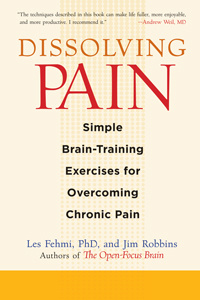Contents
Guide
For Michael, Leo, and Sophie
Contents
A users guide to the powerful attention system and how it defines your life
The vulnerabilities of the mind and the failed strategies that make things worse
The new science behind the ancient solution that works to train attention
Keep your flashlight where you need it in a distracting world
Use attention powerfully in the here and now
What you pay attention to is what you experience... and what you remember
Stop biased thinking from affecting your attention and clarity
Use meta-awareness to unlock your attentional powers
Revolutionize your interactions and relationships
Get the minimum required dose to transform your mind
You are missing 50 percent of your life. And youre not alone: everyone is.
Take a minute to picture ityour life, I mean. Scroll through the individual events, interactions, and instances that come together over the course of a day, a week, a month, a year, a lifetime. Think of it like a quilt, each square a small block of time: Here, pouring yourself a cup of coffee. Over there, reading a book to your child. Celebrating a success at work. Taking a walk in your neighborhood, climbing a mountain, diving with sharks. The mundane and the extraordinary woven together and working together, forming the story of your life.
Now, take half those quilt squares and rip them out. The irregular patchwork thats lefta cold, drafty blanket full of holesis the part of your life for which youre mentally present. The rest is gone. You didnt truly experience it. And chances are, you wont remember it.
Why? Because you werent paying attention.
Do I have your attention right now? I hope sothe idea that were missing so much of our own lives is pretty alarming. But now that I have it, I wont be able to keep it for very long. As you read this chapter, its likely that youll miss up to half of what I say. And on top of that, youll finish reading these pages convinced that you didnt miss a thing.
I say this confidently, even without knowing who you are, or how your brain might be different from the last one we tested in my lab at the University of Miami, where I research the science of attention and teach cognitive neuroscience courses. Thats because over the course of my career as a brain scientist, Ive seen certain universal patterns in the way all of our brains functionboth how powerfully they can focus, and how extraordinarily vulnerable they are to distractionno matter who you are or what you do. Ive had the opportunity to peek inside the living human brain using the most advanced brain imaging technologies available, and I know that at any given moment, theres a high probability that your mind just isnt here. Instead, youre planning for the next item on your to-do list. Youre ruminating on something thats been bothering you, a worry or a regret. Youre thinking about something that could happen tomorrow, or the next day, or never. Any way you slice it, youre not here, experiencing your life. Youre somewhere else.
Is this just part of being alive? A side effect of the human condition, something we all just have to live with? Is it really that big of a deal?
After twenty-five years of studying the science of attention, I can answer these questions. Yes, it is part of being alivein many ways, because our brains evolution was driven by specific survival pressures, our attention waxes and wanes, making us prone to being distractible. Our distractibility served us well when predators lurked around every corner. However, in todays technologically saturated, fast-paced, and rapidly shifting world, were feeling that distractibility more than ever, and we face new predators that rely on and exploit our distractibility. But no, its not something we have to just live withwe can train our brains to pay attention differently. And finally, and most importantly: yes, it is that big of a deal.
The Extraordinary Impact of Attention
Tell me if this ever describes you: At times, it feels like a struggle to stay focused. Your mind toggles between boredom and overwhelm. You feel foggyas if the crisp thinking you need to rely on is simply not there. You have a short fuse. Youre irritable. Stressed. You notice mistakes youve made: typos, skipped words, or or repeated ones. (Did you catch that?) Deadlines loom but you find it difficult to pull yourself away from your news and social media feeds. You cruise through your phone, opening app after appthen you look up, some amount of time later, wondering what you were even looking for in the first place. Youre spending a lot of time in your head, out of sync with the flow of all that is happening around you. You find yourself spinning on interactionssomething you wish you had said, something you shouldnt have said, something you should have done better.
You may be surprised to know that all of this ultimately comes down to one thing: your attention.
- If youre feeling that youre in a cognitive fog: depleted attention.
- If youre feeling anxious, worried, or overwhelmed by your emotions: hijacked attention.
- If you cant seem to focus so you can take action or dive into urgent work: fragmented attention.
- If you feel out of step and detached from others: disconnected attention.
In my research lab at the University of Miami, my team and I study and train people in some of the most extreme, high-stress, high-demand professions. We study medical and business professionals, firefighters, soldiers, and elite athletes, among others. They need to deploy their attentionand do it wellthrough extraordinarily high-stakes circumstances where their decisions could affect many people. As in critical surgeries. Deadly wildfires. Rescue operations. Active war zones. A single moment when performance can make or break a career, end or save a life. For some of these folks, if and how they pay attention is literally a matter of life and death. For all of us, its a powerful force that shapes our lives far more than we realize.
Your attention determines:
- what you perceive, learn, and remember;
- how steady or how reactive you feel;
- which decisions you make and actions you take;
- how you interact with others; and
- ultimately, your sense of fulfillment and accomplishment.
On a certain level, we all sense this alreadyconsider the language we use when we talk about attention. Pay attention, we say. We ask, May I have your attention? We see and hear information that is attention-grabbing. These common phrases illuminate what we already know instinctively: that, like currency, attention can be paid, given, or stolen; that it is extremely valuable, and also finite.
Recently, the commercial value of attention has taken center stage. As the saying goes for social media apps, If you arent paying for the product, you are the product. More precisely, your attention is the producta commodity that can be sold to the highest bidder. We now have attention merchants and attention markets. All this forecasts a brave new dystopia involving trading in human attention futures alongside cattle, oil, and silver. Yet attention is not something that can be banked or borrowed. It cannot be saved to use later. We can only use our attention in the here and nowin this moment.
What Is Attention, Exactly?
The attention system exists to solve one of your brains biggest problems: there is far too much information in the environment for your brain to fully process. To avoid getting overloaded, your brain uses

